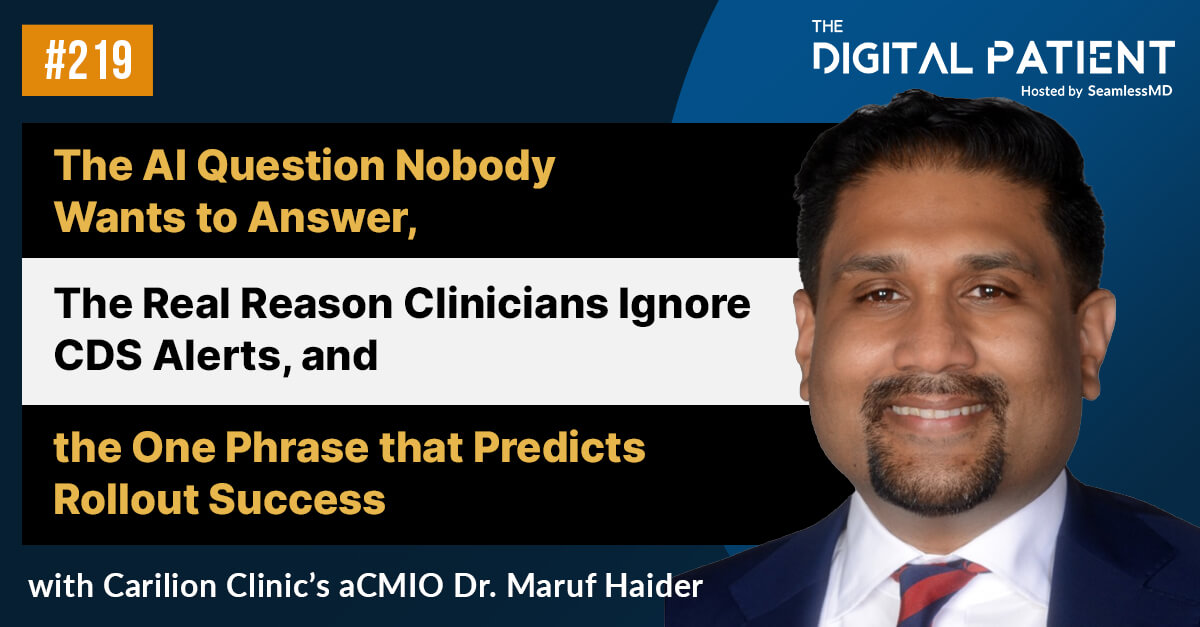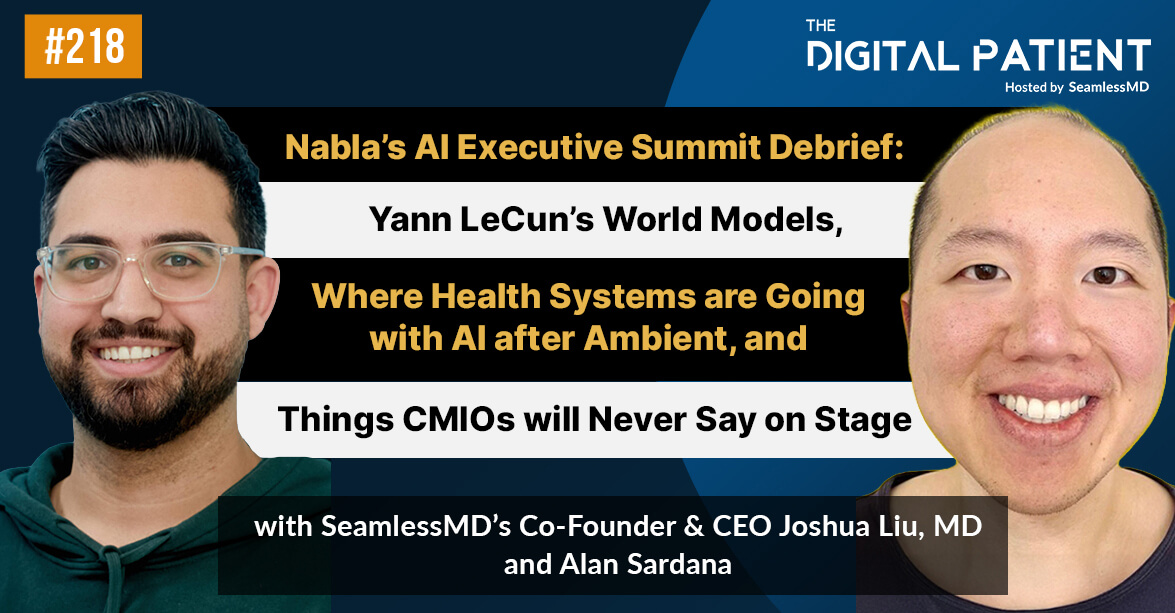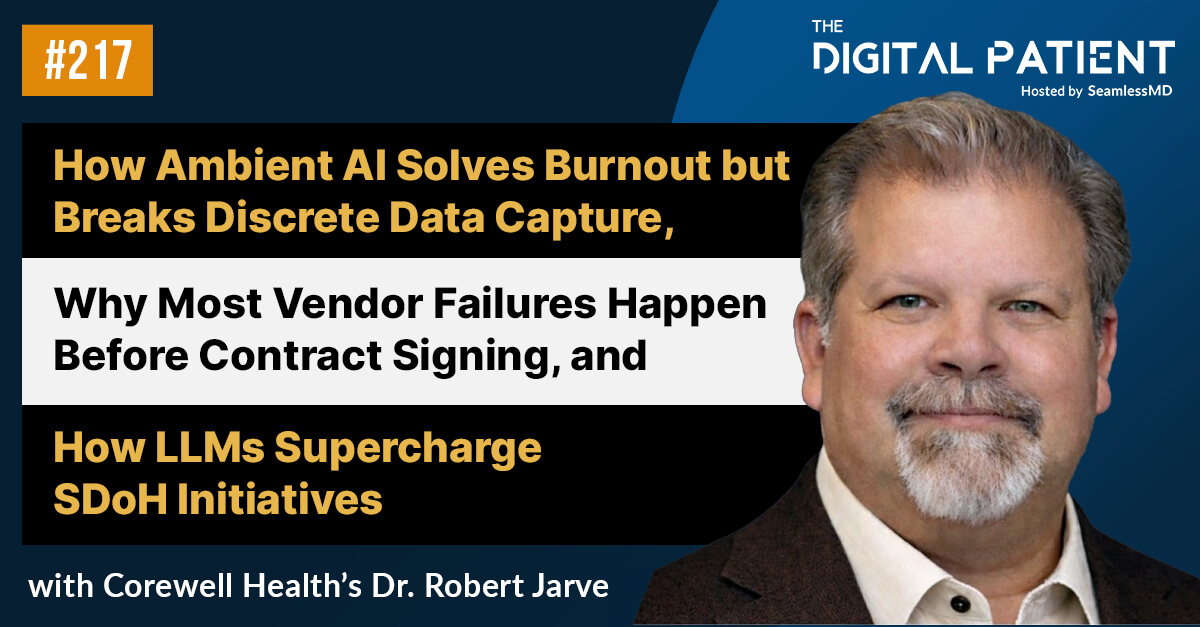Subscribe on: RSS | SPOTIFY | APPLE PODCAST | GOOGLE | BREAKER | ANCHOR
Audio:
Video:
In this episode of the SeamlessMD Podcast, Dr. Joshua Liu, Co-founder & CEO at SeamlessMD, and marketing colleague, Alan Sardana, chat with Dr. James Chan, Director of Innovation at the Sault Area Hospital, about "Systematically Implementing Innovation for Health Systems". See the full show notes below for details.
Guest(s):
Dr. James Chan, Director of Innovation at the Sault Area Hospital
Dr. Joshua Liu (@joshuapliu), Co-founder & CEO at SeamlessMD
Episode 54 – Show notes:
[0:00] Introducing Dr. James Chan, PhD, Director of Innovation at Sault Area Hospital, sessional faculty in the DeGroote School of Business at McMaster University and guest lecturer at the Health Quality Programs at Queens University;
[1:50] How Dr. Chan fell into Innovation circuitously, following his passion for quality improvement and venturing beyond quality in its traditional sense to bring new technologies into healthcare;
[3:40] How Sault Area Hospital serves a diverse population (75,000+) comprised of significant rural & indigenous populations in the Sault Area community which borders Michigan state;
[5:45] How Dr. Chan had been pursuing innovative virtual care technologies such as digital patient engagement prior to COVID-19 and why the pandemic was an instigator to accelerate innovation in healthcare such as implementing digital patient engagement (SeamlessMD) for its Orthopedics, Colorectal, Obstetrics & Gynecology, Urology and Hepato-Pancreatico-Biliary service lines;
[7:20] How Dr. Chan describes SeamlessMD (digital patient engagement technology) as a way to stay connected with your healthcare team before and after an intervention regardless of location because of its ability to interact with the patient to provide support, education and coaching;
[10:15] Why Dr. Chan believes having a co-design process with physicians & patients was a key reason why the team at Sault Area Hospital was so enthusiastic to trying new technologies and how it was important to remain flexible in meeting with all stakeholders before implementing the technology;
[13:40] Why Dr. Chan believes having patient advisory committees to co-design care is vitally important when implementing new technologies as patients are more engaged and receive better care when they are participants as opposed to objects of care;
[19:20] Why Dr. Chan focuses on simplifying the “app ecosystem” in his health system as opposed to implementing as many technologies as possible because it forces his team to iterate, following the scientific method (Plan, Do, Study, Act) to systematically learn, grow and scale effectively;
[24:50] Why Dr. Chan believes Einstein when he stated: “Not everything that can be counted counts and not everything that counts can be counted” especially as it relates to patient care and quality where certain intangibles matter as much if not more than tangible data points, and why Dr. Chan believes Patient-Reported Outcomes provide a decent multi-faceted measurement scheme for patients to relay important outcomes such as their physiology, psychology and experience;
[29:15] Why Dr. Chan believes virtual care will replace many of the quick healthcare interactions because it benefits both the patient and provider, but any intense interaction that requires more insight will remain face-to-face despite a rapidly evolving technology landscape;
[32:40] Why Dr. Chan recommends healthcare leaders to consult widely with many stakeholders (e.g. IT, physicians, patients, frontline staff) when implementing digital patient engagement or any innovation as it takes a village to make an initiative successful and wider consultation leads to better input and engagement;
[34:50] Fast 5 / Lightning Round:
Q1: What inspired you to work in Healthcare?
“I knew I wanted to help people and so rather than stay in the private sector I decided to move into healthcare and I haven’t looked back.”
Q2: How has an apparent failure set you up for greater success?
“I look at failure as a learning opportunity. If it’s safe… Sometimes it’s a good thing to fail fast… Having iterative cycles of learning is a process… So really, I’ve always been learning.”
Q3: Would you rather have Super Strength, Super Speed, or the ability to Read People’s Minds?
“I’d have to go with mind reading because if you can read minds you would have super speed. The soft stuff is the hard stuff… I’m talking about interpersonal relations, conflict resolution, politics, and the ability to engage people… Those are the harder things to navigate and do them well. If you could mind read, you could anticipate what their concerns are, their hopes and dreams.”
Q4: What is something in healthcare you believe that others might think is insane?
“The complexity!”
Q5: What is one hobby or activity that you’ve gotten into since the beginning of the pandemic?
“Becoming more familiar with nature.”
.svg)










.png)
